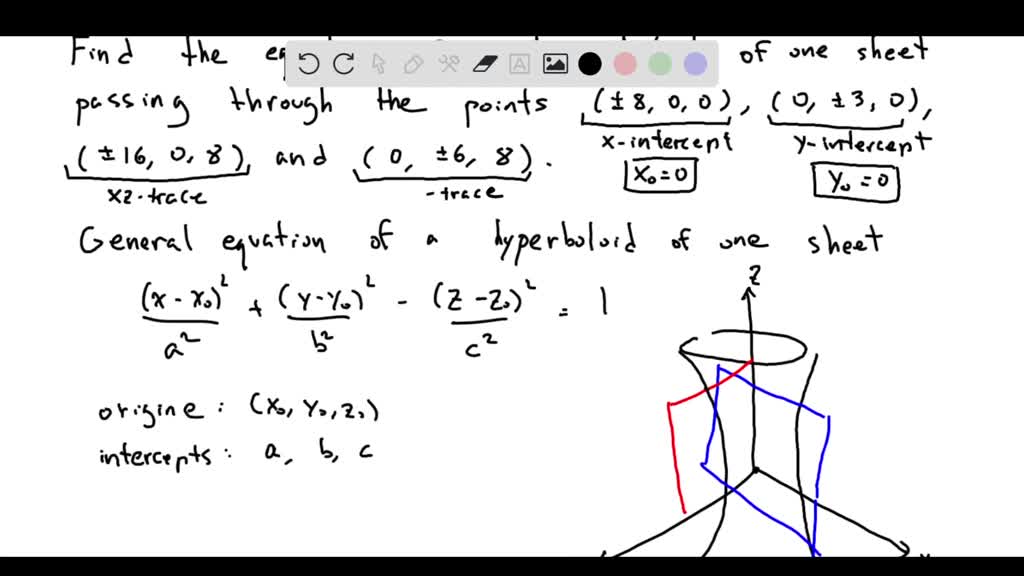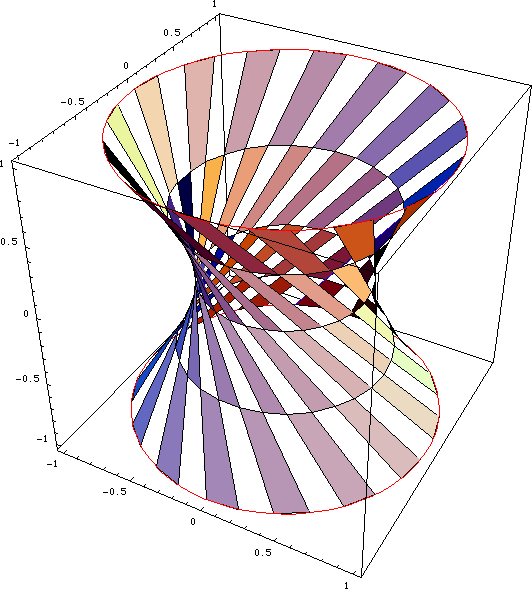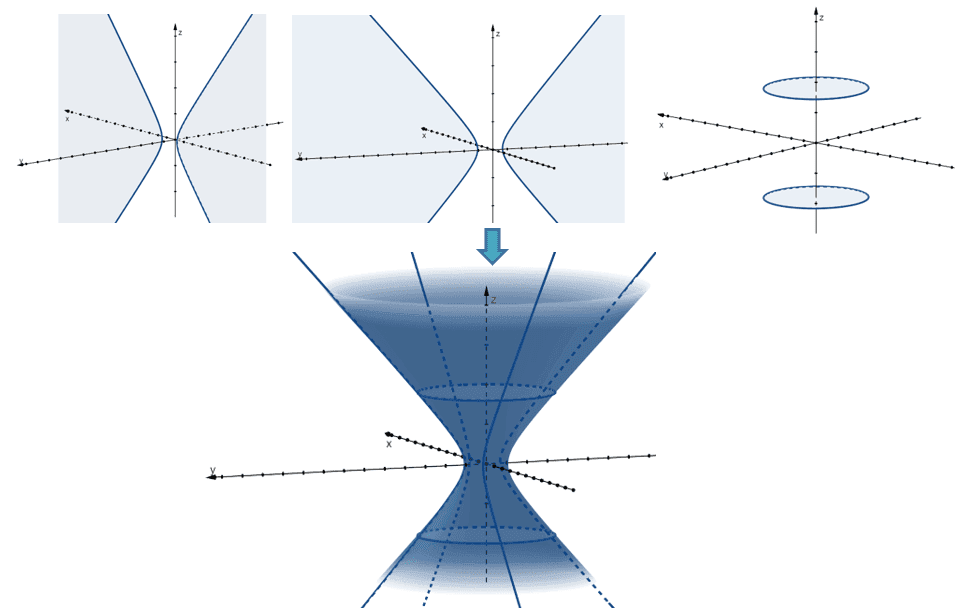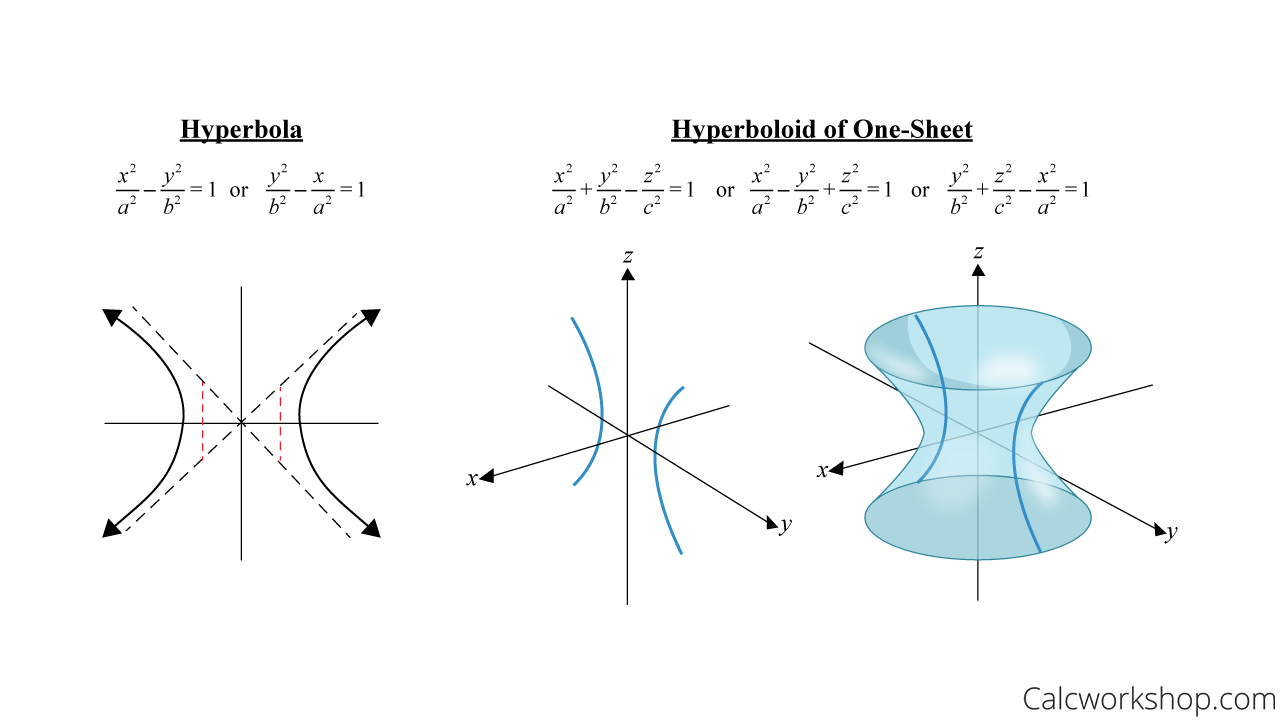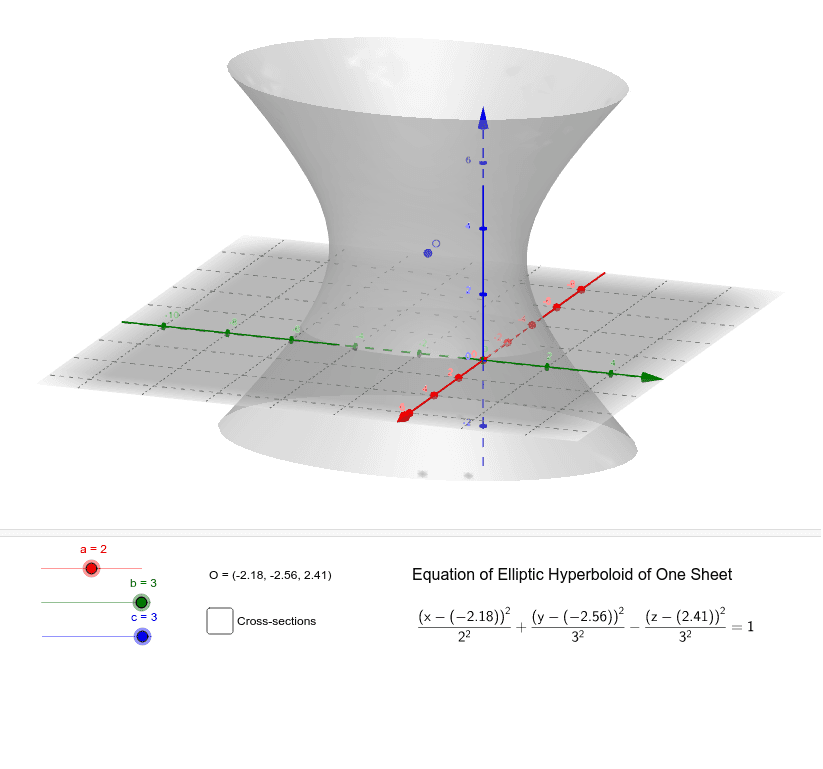One Sheet Hyperboloid Equation - The diameter at the base is 280 m. The horizontal cross sections are ellipses — circles,. Here is the equation of a hyperboloid of one sheet. A cooling tower for a nuclear reactor is to be constructed in the shape of a hyperboloid of one sheet. A hyperboloid of one sheet is any surface that can be described with an equation of the form \( \dfrac{x^2}{a^2}+\dfrac{y^2}{b^2}−\dfrac{z^2}{c^2}=1\).
A cooling tower for a nuclear reactor is to be constructed in the shape of a hyperboloid of one sheet. Here is the equation of a hyperboloid of one sheet. The diameter at the base is 280 m. A hyperboloid of one sheet is any surface that can be described with an equation of the form \( \dfrac{x^2}{a^2}+\dfrac{y^2}{b^2}−\dfrac{z^2}{c^2}=1\). The horizontal cross sections are ellipses — circles,.
The horizontal cross sections are ellipses — circles,. The diameter at the base is 280 m. Here is the equation of a hyperboloid of one sheet. A cooling tower for a nuclear reactor is to be constructed in the shape of a hyperboloid of one sheet. A hyperboloid of one sheet is any surface that can be described with an equation of the form \( \dfrac{x^2}{a^2}+\dfrac{y^2}{b^2}−\dfrac{z^2}{c^2}=1\).
SOLVED Find the equation of the hyperboloid of one sheet passing
The horizontal cross sections are ellipses — circles,. The diameter at the base is 280 m. A hyperboloid of one sheet is any surface that can be described with an equation of the form \( \dfrac{x^2}{a^2}+\dfrac{y^2}{b^2}−\dfrac{z^2}{c^2}=1\). Here is the equation of a hyperboloid of one sheet. A cooling tower for a nuclear reactor is to be constructed in the shape.
QuadraticSurfaces
A hyperboloid of one sheet is any surface that can be described with an equation of the form \( \dfrac{x^2}{a^2}+\dfrac{y^2}{b^2}−\dfrac{z^2}{c^2}=1\). The diameter at the base is 280 m. The horizontal cross sections are ellipses — circles,. A cooling tower for a nuclear reactor is to be constructed in the shape of a hyperboloid of one sheet. Here is the equation.
Hyperboloid of One Sheet
The diameter at the base is 280 m. A hyperboloid of one sheet is any surface that can be described with an equation of the form \( \dfrac{x^2}{a^2}+\dfrac{y^2}{b^2}−\dfrac{z^2}{c^2}=1\). The horizontal cross sections are ellipses — circles,. A cooling tower for a nuclear reactor is to be constructed in the shape of a hyperboloid of one sheet. Here is the equation.
Quadric Surface The Hyperboloid of One Sheet Vector Calculus YouTube
The horizontal cross sections are ellipses — circles,. The diameter at the base is 280 m. A hyperboloid of one sheet is any surface that can be described with an equation of the form \( \dfrac{x^2}{a^2}+\dfrac{y^2}{b^2}−\dfrac{z^2}{c^2}=1\). Here is the equation of a hyperboloid of one sheet. A cooling tower for a nuclear reactor is to be constructed in the shape.
Graphing a Hyperboloid of One Sheet in 3D YouTube
The horizontal cross sections are ellipses — circles,. Here is the equation of a hyperboloid of one sheet. The diameter at the base is 280 m. A cooling tower for a nuclear reactor is to be constructed in the shape of a hyperboloid of one sheet. A hyperboloid of one sheet is any surface that can be described with an.
Video 2962 Calculus 3 Quadric Surfaces Hyperboloid of one sheet
A hyperboloid of one sheet is any surface that can be described with an equation of the form \( \dfrac{x^2}{a^2}+\dfrac{y^2}{b^2}−\dfrac{z^2}{c^2}=1\). Here is the equation of a hyperboloid of one sheet. The diameter at the base is 280 m. A cooling tower for a nuclear reactor is to be constructed in the shape of a hyperboloid of one sheet. The horizontal.
Quadric surfaces Definition, Types, and Examples
A hyperboloid of one sheet is any surface that can be described with an equation of the form \( \dfrac{x^2}{a^2}+\dfrac{y^2}{b^2}−\dfrac{z^2}{c^2}=1\). The diameter at the base is 280 m. Here is the equation of a hyperboloid of one sheet. The horizontal cross sections are ellipses — circles,. A cooling tower for a nuclear reactor is to be constructed in the shape.
Chapter 12Section6 Quadric Surfaces ppt video online download
A hyperboloid of one sheet is any surface that can be described with an equation of the form \( \dfrac{x^2}{a^2}+\dfrac{y^2}{b^2}−\dfrac{z^2}{c^2}=1\). The diameter at the base is 280 m. A cooling tower for a nuclear reactor is to be constructed in the shape of a hyperboloid of one sheet. The horizontal cross sections are ellipses — circles,. Here is the equation.
Quadric Surfaces (Identified and Explained w/ Examples!)
Here is the equation of a hyperboloid of one sheet. A cooling tower for a nuclear reactor is to be constructed in the shape of a hyperboloid of one sheet. A hyperboloid of one sheet is any surface that can be described with an equation of the form \( \dfrac{x^2}{a^2}+\dfrac{y^2}{b^2}−\dfrac{z^2}{c^2}=1\). The horizontal cross sections are ellipses — circles,. The diameter.
Elliptic Hyperboloid of One Sheet GeoGebra
Here is the equation of a hyperboloid of one sheet. A hyperboloid of one sheet is any surface that can be described with an equation of the form \( \dfrac{x^2}{a^2}+\dfrac{y^2}{b^2}−\dfrac{z^2}{c^2}=1\). A cooling tower for a nuclear reactor is to be constructed in the shape of a hyperboloid of one sheet. The horizontal cross sections are ellipses — circles,. The diameter.
The Horizontal Cross Sections Are Ellipses — Circles,.
The diameter at the base is 280 m. A cooling tower for a nuclear reactor is to be constructed in the shape of a hyperboloid of one sheet. Here is the equation of a hyperboloid of one sheet. A hyperboloid of one sheet is any surface that can be described with an equation of the form \( \dfrac{x^2}{a^2}+\dfrac{y^2}{b^2}−\dfrac{z^2}{c^2}=1\).
